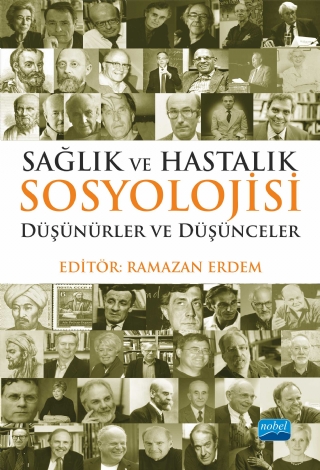Commune Problems \ 1-1

Considering scientific studies, the approaches put forward are not independent of the subjective situations of those who produce them. All theories and conceptualizations bear traces of the special experiences of their owners. In this respect, it is valuable to examine the thinkers and thoughts that look at a subject from different perspectives. Based on such a justification, this book brings together thinkers with sociological perspectives on illness and health. For this purpose, 49 names from different fields, but thought to be related to health and disease, were studied. thinkers; short life stories, basic thoughts, views on health and disease have been systematically examined, and a different, rich and valuable information has emerged about the sociology of health and illness.

Scientific theory is a set of propositions to explain the formation of the universe. Scientific sociological theory, on the other hand, is a set of propositions to explain how the universe of social action, interaction and organization works. Our view of the world is based on our theoretical perspective. It is possible to realize the complexity and ambiguity of the ordinary aspects of the social world, by looking at the routines of daily life again with sociological theories. While doing sociology, sociologists focus on certain aspects of events, approach their subjects with some acceptance, give weight to some research methods and seek answers to some specific questions. This theoretical view brings about the emergence of an explanatory and systematic result. Sociological theories are not formal and empty patterns, but on the contrary, modernity, family, city, consumption, disability, risk, old age, epidemic diseases such as Covid-19, refugees, occupations, etc. It is directly related to various areas of daily life. How we see, understand and explain these areas of daily life, as well as how we act in them, is closely related to what shape it takes.
Trying to understand human behavior, interaction and order, sociology focuses on a more systematic exploration and rediscovery of what people do in their daily lives and routines. Even if the apparent ordinariness of everyday life makes theoretical studies on the concept difficult, sociological discussions have an important place in this discovery process.
In this study, which strives to understand sociological theories, sociological debates of traditional and modern periods, and various fields/concepts of daily life, issues that can be classified in the context of both the comprehensive features of social structures and institutions and the details of individual encounters and human interactions are discussed. .
Trying to understand human behavior, interaction and order, sociology focuses on a more systematic exploration and rediscovery of what people do in their daily lives and routines. Even if the apparent ordinariness of everyday life makes theoretical studies on the concept difficult, sociological discussions have an important place in this discovery process.
In this study, which strives to understand sociological theories, sociological debates of traditional and modern periods, and various fields/concepts of daily life, issues that can be classified in the context of both the comprehensive features of social structures and institutions and the details of individual encounters and human interactions are discussed. .